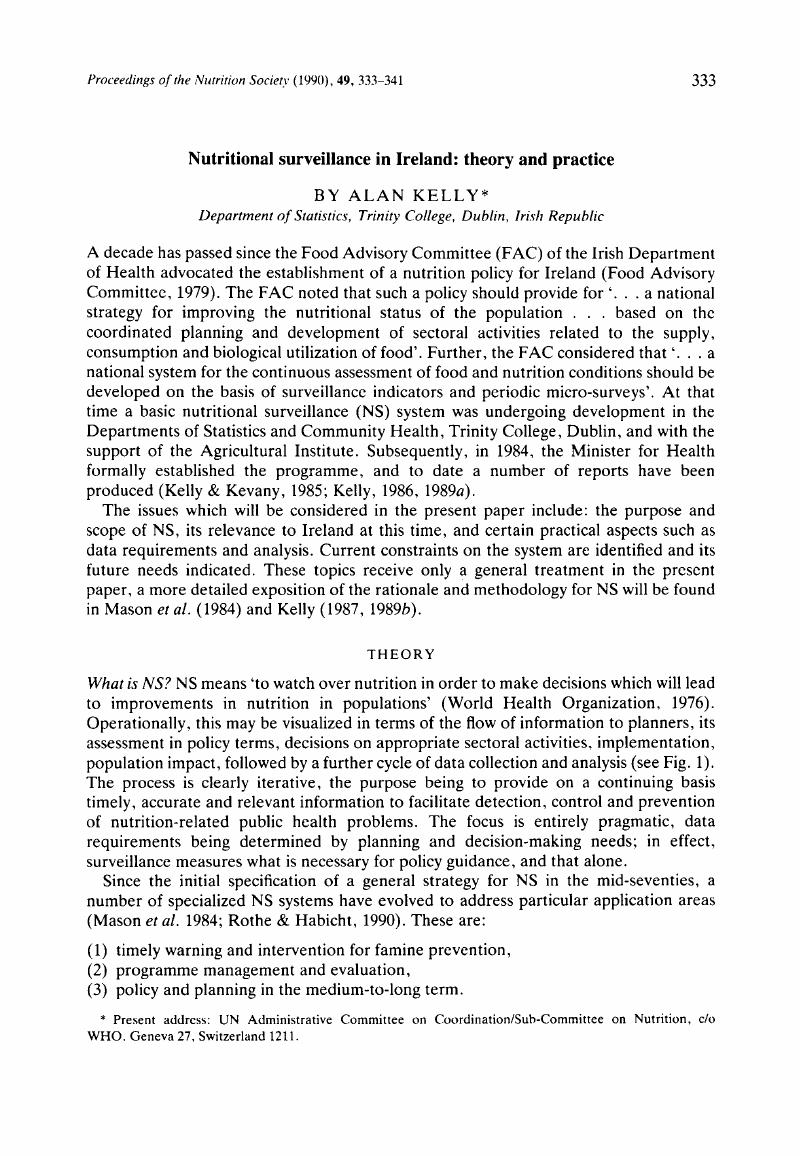No CrossRef data available.
Article contents
Nutritional surveillance in Ireland: theory and practice
Published online by Cambridge University Press: 28 February 2007
Abstract
An abstract is not available for this content so a preview has been provided. As you have access to this content, a full PDF is available via the ‘Save PDF’ action button.

Information
- Type
- Symposium on ‘Recent Studies on Food and Nutrient Intake in Ireland’
- Information
- Copyright
- Copyright © The Nutrition Society 1990
References
Abraham, B. & Ledolter, J. (1983). Statistical Methods for Forecasting. New York: Wiley & Sons.CrossRefGoogle Scholar
ACC/SCN (1989). Suggested Approaches for Nutritional Surveillance with Particular Reference to Structural Adjustment. Working Paper, Administrative Committee on Coordination/Sub-Committee on Nutrition. Geneva: WHO.Google Scholar
Boruch, R. (1984). Research on the use of statistical data. In Proceedings of the Social Statistics Section of the American Statistical Association, 1984. Washington, DC: American Statistical Association.Google Scholar
Chatfield, C. (1978). The Holt-Winters forecasting procedure. Journal of the Royal Statistical Society 27C, 264–279.Google Scholar
Clark, N. (1983). Statistical presentation - of what, to whom and for which purpose? In Proceedings of the Social Statistics Section of the American Statistical Association, 1983. Washington, DC: American Statistical Association.Google Scholar
Davis, G. & Olson, M. (1984). Management Information Systems: Conceptual Foundations, Structure and Development, New York: McGraw-Hill.Google Scholar
De Wals, P. (1987). Use of Mortality and Morbidity Statistics for Nutritional Surveillance. In Nutritional Surveillance in Europe: A Critical Appraisal. Annex II - EURONUT Report no. 9, pp. 116–127 [Kelly, A. editor]. Wageningen, The Netherlands: Agricultural University, Wageningen.Google Scholar
Ferro-Luzzi, A. & D'Amicis, A. (1987). Scope for Nutritional Anthropometry within a Nutritional Surveillance System in Europe. In Nutritional Surveillance in Europe: A Critical Appraisal. Annex III - EURONUT Report no. 9, pp. 128–140 [Kelly, A., editor]. Wageningen, The Netherlands: Agricultural University, Wageningen.Google Scholar
Food Advisory Committee (IRE) (1979). Considerations for a Food and Nutrition Policy in Ireland. Dublin: Department of Health.Google Scholar
Food and Agriculture Organization (1984). Food Balance Sheets, 1979–81 Average. Rome: FAO.Google Scholar
Gormley, T., Downcy, G. & O'Beirne, D. (1987). Food, Health and the Consumer. Brussels: FAST, CEC.Google Scholar
Greenacre, M. (1984). Theory and Applications of Correspondence Analysis. London: Academic Press.Google Scholar
Habicht, J. -P. (1988). Nutritional surveillance. Working paper for the US AID Workshop on Nutritional Surveillance, Annapolis. Washington, DC: United States Agency for International Development.Google Scholar
Härö, A. (1980). Information systems for health services at the national level. In Information Systems for the Health Services. Public Health in Europe no. 13. Copenhagen: WHO/EURO.Google Scholar
Kelly, A. (1986). Nutritional Surveillance in Ireland: Report for 1985. Dublin: Medico-Social Research Board.Google Scholar
Kelly, A. (editor) (1987). Nutritional Surveillance in Europe: A Critical Appraisal. EURONUT Report no. 9. Wageningen, The Netherlands: Agricultural University, Wageningen.Google Scholar
Kelly, A. (1989 a). Nutritional Surveillance in Ireland: Part 1: The National Diet 1961–1986 with Forecasts to 1992. Dublin: Department of Health, Ireland.Google Scholar
Kelly, A. (1989 b). Rationale and Methodology for Nutritional Surveillance in Ireland: A Report to the Irish Department of Health. Dublin: Department of Health, Ireland.Google Scholar
Kelly, A. & Kevany, J. (1985). Nutritional Surveillance in Ireland: Report for 1984. Dublin:. Medico-Social Research Board.Google Scholar
Mahon, B. H. (1977). Statistics and Decisions: The Importance of Communications and the Power of Graphical Presentation. Journal of the Royal Statistical Society 140A, 298–307.CrossRefGoogle Scholar
Mason, J. (1987). Report of the ACC/SCN Working Group on Nutritional Surveillance: Proposal for Expanding Nutritional Surveillance. SCN 87/NSURVL, Administrative Committee on Coordination/Sub-Committee on Nutrition. Geneva: WHO.Google Scholar
Mason, J., Habicht, J. -P., Tabatabai, H. & Valverde, V. (1984). Nutritional Surveillance. Geneva: WHO.Google Scholar
Organization for Economic Co-operation and Development (1985). Food Consumption Statistics, 1973–1982. Paris: OECD.Google Scholar
Rothe, G. E. & Habicht, J. -P. (1990). Nutritional surveillance: State of the art. In World Food Issues, [Latham, M. C. and Brun, T., editors]. New York: Center for the Analysis of World Food Issues, Cornell University (In the Press).Google Scholar
Silverman, B. W. (1985). Some aspects of the spline smoothing approach to non-parametric regression curve fitting. Journal of the Royal Statistical Society 47B, 1–52.Google Scholar
Tukey, J. (1979). Methodology, and the statistician's responsibility for both accuracy and relevance. Journal of the American Statistical Association 74, 786–793.CrossRefGoogle Scholar
World Health Organization (1976). Methodology of nutritional surveillance. Technical Report Series no. 593. Geneva: WHO.Google Scholar
WHO/EURO (1990). Food and Health in Europe: Information Systems for Nutrition Policy Making. Copenhagen: Nutrition Unit, WHO/EURO (In the Press).Google Scholar

